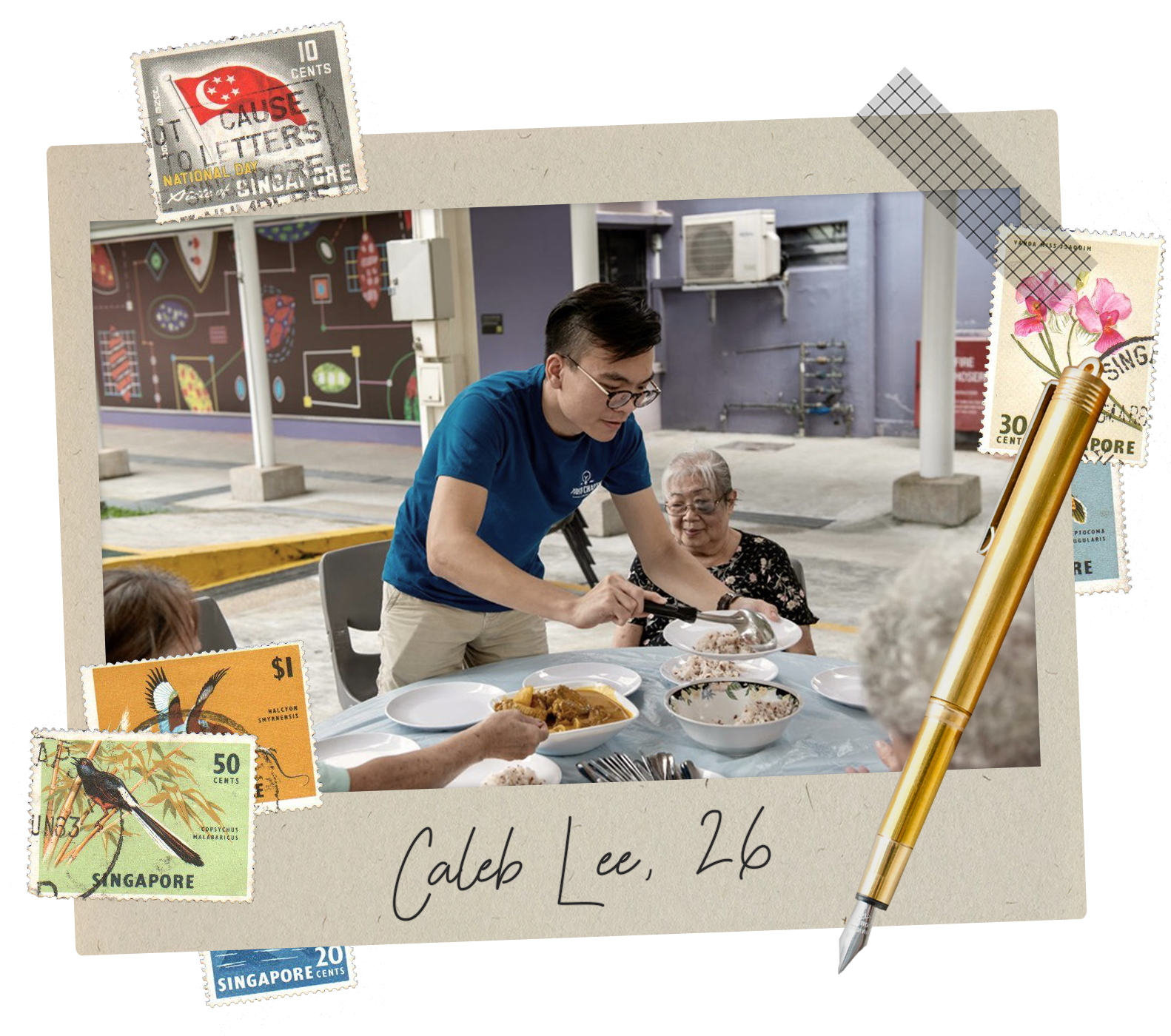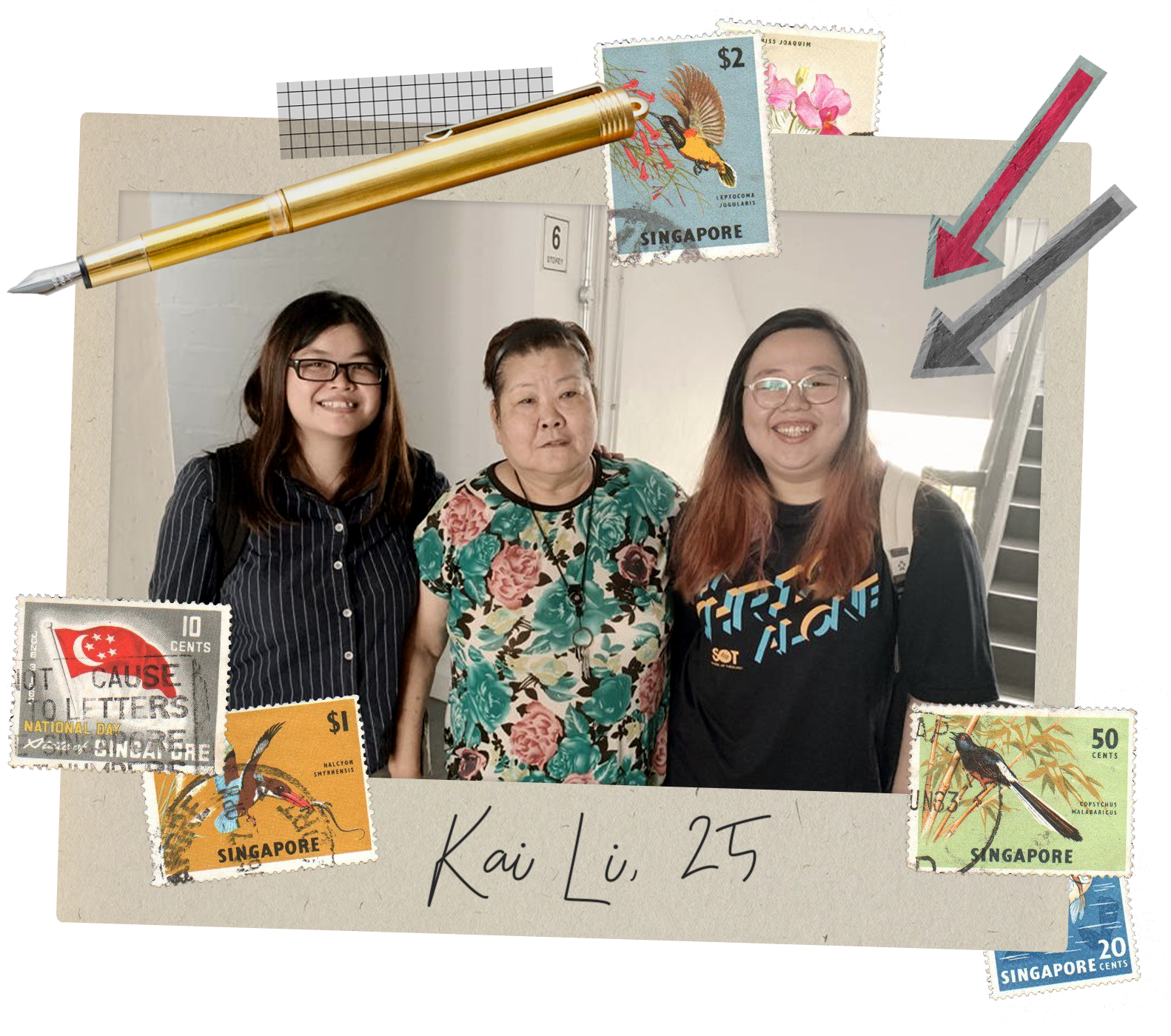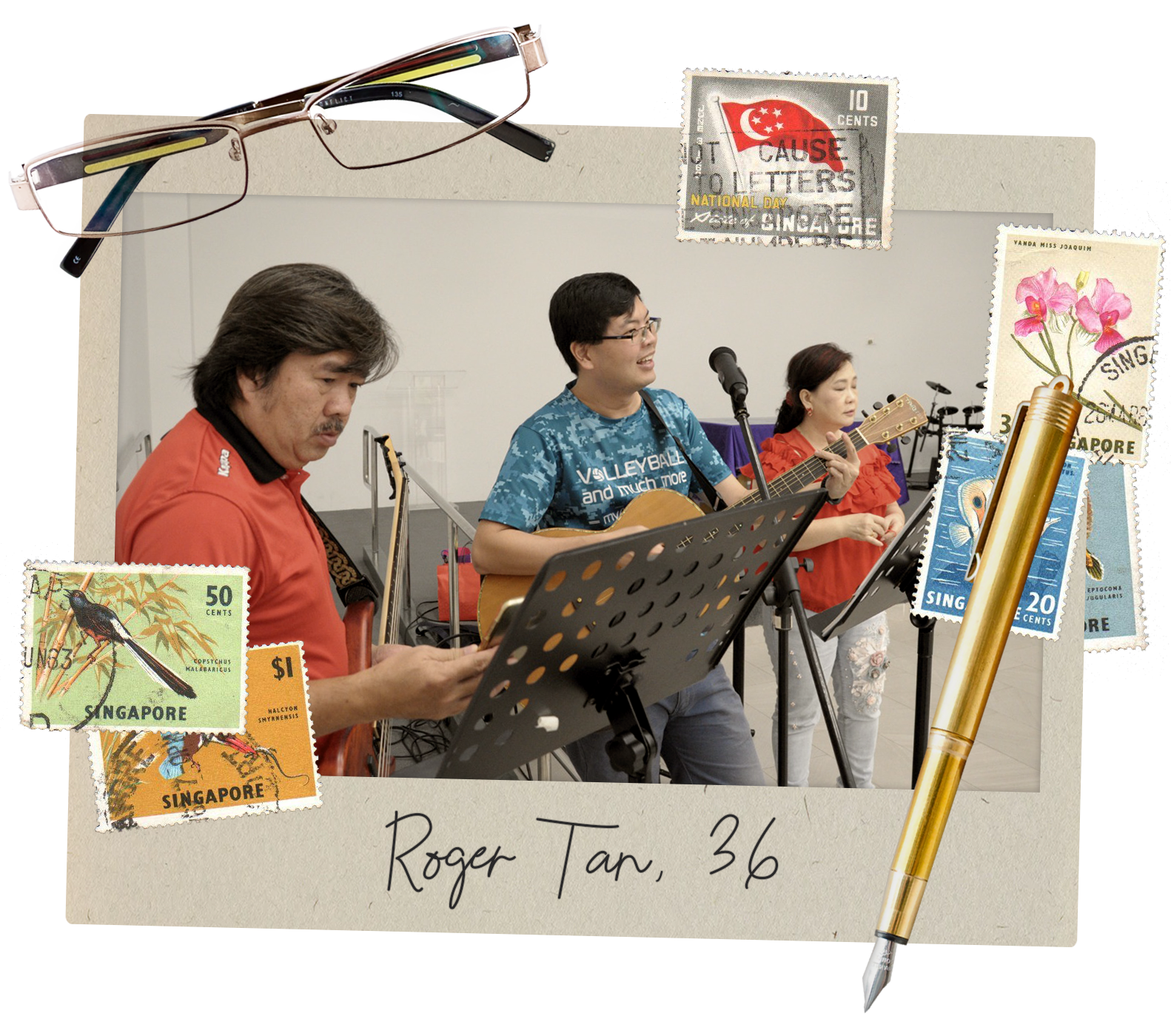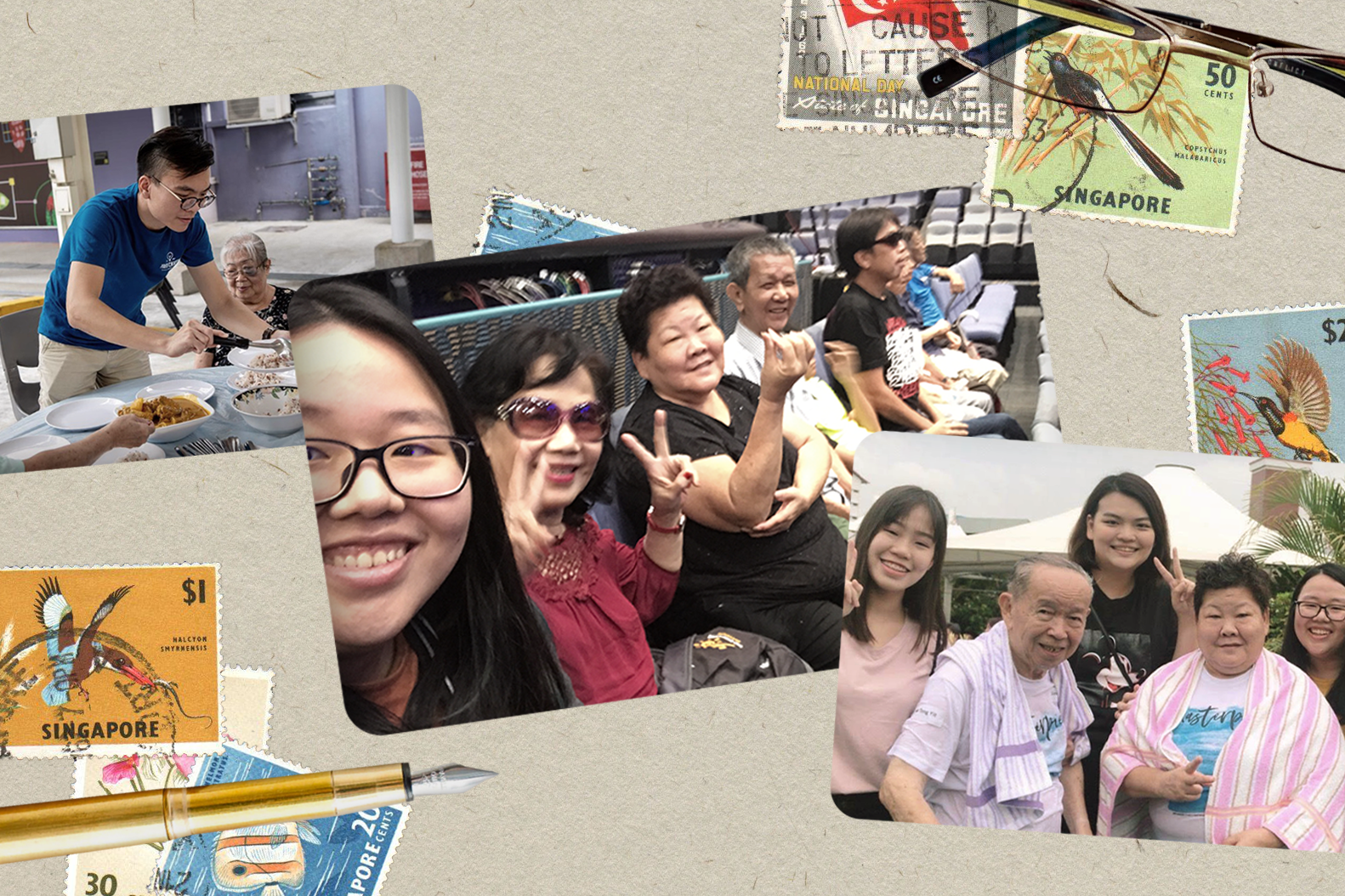In this COVID-19 age, what is it like for professionals and volunteers who serve the elderly? How can we help older folks who are some of the most vulnerable people in Singapore?
To gain insight into what it’s like to serve our seniors, we spoke to six Christians from three churches to share their experiences.
- Wesley Methodist Church, Mandarin Ministry: Ian Wang (33)
- City Harvest Church, Dialect Ministry: Kai Li (25), Jia Mian (29)
- Jurong Christian Church, Hokkien Ministry: Caleb Lee (26), Roger Tan (36), Lian Khup (36)
Difficulties with sharing the gospel and leadership renewal were just some of the many insights we gleaned through our conversations together.
When did you start serving the elderly, and how?
Kai Li: I started serving in 2016. I would do home visitations and go door-to-door giving out flyers inviting seniors to church.
Currently services are online, so I serve through flashing slides or worship lyrics for the elderly.

Caleb: I began in 2013 within the Taman Jurong community. There I oversee a group of youths and mentor them to befriend the elderly, especially those living alone.
For church, I recently participated in our Goshen Initiative: Together with church volunteers, we visited seniors living in Taman Jurong’s rental flats every Friday to give out bread, interact with them and help solve issues affecting them if we can.
Jia Mian: I started around 2011. Every week I’ll go down to Bishan-Ang Mo Kio estate with other volunteers to pick up the elderly for church services.
As for visitations, I try visiting seniors monthly to befriend them. Now it’s difficult to do visitation due to COVID-19. So I catch up with them through phone calls instead.
Ian: I serve the elderly through my work. In 2014 I worked at Pioneer Generation Office. I did home visitations to find out about the elderly’s social support or health situation, and also tell them about their pioneer generation card which lets them enjoy medical subsidies.
This year, I started working in a nursing home for seniors with dementia. My role is to assist them with their daily routine and activities that stimulate them mentally.

Roger: I serve the elderly through the Dialect Ministry’s worship team. I’ve been doing this since 2015.
About once a month I’ll also get other youths to come and serve. I’ll practice with them and prepare them for dialect worship sessions.
Lian Khup: I’ve been serving in the worship team since 2016. I play bass and guitar.
I’ve also been involved in events for the elderly like outreach programmes or games. Not so much with planning, but more on providing manpower through helping to serve food or setting up the place.
Why did you start serving the elderly?
Kai Li: I started serving to stand in the gap. There was a need and I was willing to meet that need.
I started with visitations, then was asked to help with busing, then staff asked if I wanted to serve in visual communications.
Every opportunity that came, wherever they needed help, I felt a desire to be there.
Caleb: I began because I noticed an issue of loneliness among the elderly, which is even clearer during this pandemic.
Many seniors live alone, and their children tend not to visit to avoid possible COVID-19 transmission.
This loneliness breaks God’s heart. In Exodus, we learn that when God sees suffering, He sends people to help. So I felt God wanted to send me, and I decided to serve.
Jia Mian: As I grew up with my grandparents, I’m naturally comfortable with seniors and enjoy my relationships with them. This led me to desire share God’s love with other elderly as well.
Hence when there was ministry recruitment, I decided to join and serve in the Dialect Ministry.
Ian: For me, I started because I wanted to find more meaning in my work. Many in my generation are not close to our grandparents.
I thought that through serving the elderly, I can learn how to get closer to those in my grandparent’s generation, while also learning dialect so I can speak with seniors in the community.
Many seniors live alone, and their children tend not to visit to avoid possible COVID-19 transmission. This loneliness breaks God’s heart.
Roger: I know many seniors who only speak dialect like my grandma.
Thus, I initially joined the Dialect Ministry to learn Hokkien so I can share the gospel with these seniors.
There was also a lack of musicians, so I helped out. In the midst of serving, I felt God was leading me in this direction, so I decided to keep on serving in this aspect.
What are some challenges you have faced?
Caleb: One challenge is figuring out how to be more intentional with sharing the Gospel. I recently visited an elderly lady who shared how she received winning 4D numbers from a white figure when she was sleeping.
While listening, I contemplated how to weave in Christianity. But I struggled and could not share the Gospel. So I’ve been praying for God to help me be more prepared in this area.

Jia Mian: I do struggle emotionally when seniors fall ill. The first elderly who got sick during my time serving was someone close to me. I used to visit him after school to have dinner together.
But at one point, he got a stroke and was hospitalised. During such times I manage my emotions by sharing them with others and seeking God to leave everything up to Him.
Roger: One challenge I face is bringing in more youths to serve.
My ministry is struggling with renewing its leadership, since a lot of young adults don’t join as they can’t speak the dialect.
Which is why I’m thankful to God for the youths who do serve. Though they don’t know the language, they still serve as they have a heart for these seniors.
What are some positive aspects of serving the elderly?
Caleb: I have learned so much from the elderly. They wish to pass down their knowledge to the next generation, so they taught me dialect and how to cook dishes like chilli or dim sum.
Serving also pushed me to do things I’d normally never do. There was one time I saw an elderly I serve at a void deck funeral. She was alone and looked tired.
I dislike funerals, but that night I felt God tell me to help. I told her to go home while I stayed to watch over things.
I was scared, but when God calls you to do something, He prepares the path for you. So thankfully another volunteer agreed to accompany me.
Kai Li: Serving as a youth is a perk because seniors are more lenient with us. The same way we’re kinder to children, they’re kinder to us!
I’ve also obtained a deeper understanding of my parents and grandparents. Serving helped me better understand their fears, like what they’re going through with their ageing bodies.
Most importantly, it’s shown me how to share the hope of Christ with them.

Ian: Serving has made me more appreciative. The elderly are living history books. Some were born in the 1940s and experienced the horrible Japanese Occupation.
There are also seniors from the 1950s who built up Singapore’s infrastructure through hard labour.
When this generation passes, I wish there’ll be people who’ll raise their hands and say: I’m available, God use me.
Hearing these seniors share about their difficult lives causes me to feel appreciative of Singapore today.
I have also seen elderly who can no longer do everyday things like walking, toileting or feeding themselves. Witnessing such ailments makes me appreciate and cherish life more.
Lian Khup: I enjoy spending time with the elderly: Many seniors feel neglected so when we bring them out for activities, I get to witness this genuine joy in them!
Could you share your future hopes for ministries that serve the elderly?
Ian: My future hope is these ministries will obtain the skills needed to empower the elderly to continue living active and vibrant lives.
Through serving, I realised many seniors are upset about no longer being as mobile.
If we can assure them they can still eventually do what they love through small steps like moving a finger today, then moving a hand tomorrow — they will slowly regain their confidence.
Caleb: I hope these ministries will continue to grow. When this generation passes, I wish there’ll be people who’ll raise their hands and say: I’m available, God use me.
I know this can be difficult, as learning a dialect is challenging, but I wish they’ll still be willing.
In the community, I also hope seniors will be more open to the Holy Spirit. I’ve met so many who are sick and in pain; I wish they’ll allow Christians to pray for them and have faith that the Holy Spirit will heal them.

Kai Li: I hope there’ll be a revival for seniors, that more of them will be saved. Many are at their last stage, but if their souls are saved now they will have eternity.
I have served elderly who have past trauma or grew up early to take care of their family. They have worked their whole lives and now don’t have anything to look forward to.
Hence, I hope more of them will know Christ, so they can experience God’s love at this last part of their lives.
What would you say to youths regarding serving the elderly?
Jia Mian: If you have some interest, go forth and do it. You can even serve with friends to make the experience more joyful and fun.
If you’re not interested yet, I encourage you to try doing small things for the elderly in your neighbourhood. Just say good morning or hello if you happen to see them.
You’ll feel their warmth and friendliness through such interactions, which may lead you to desire to serve them.
Ian: If you have the heart to serve but don’t have experience, I’ll say you’ll need patience. Sometimes seniors don’t speak but will signal with their body language.
They get frustrated if you don’t understand what they’re trying to convey, so you need patience to slowly learn to understand them.
If you’re not as keen, do try to at least be engaged with your grandparents. You can show your love and care through little gestures like giving them water or talking to them.
Roger: If you want to serve the elderly through the worship ministry, just try. Don’t worry about how talented you are.
I also serve in the English Ministry, so I know serving seems intimidating as people can be quite critical. But in the Dialect Ministry, our seniors don’t mind if you play the wrong key.
They will still accept you, thank you and appreciate you for serving them.
Lian Khup: I want to encourage the youths who never thought of serving, by saying that this is one possible way you can serve God.
We show others that we love Him by loving His people. So let’s serve the elderly, as though we are serving the Lord!
- Based on your skills, passions and opportunities at your church, what are some ways you might serve the elderly?
- What are some verses or promises from the Bible that you can anchor your service on?
- Ask the Lord to bring a friend to mind whom you might serve together with!









